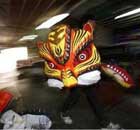Foreign and Military Affairs
What's behind Obama-Dalai Lama meeting?
(Xinhua)
Updated: 2010-02-19 09:43
 |
Large Medium Small |
BEIJING: Despite China's firm and repeated opposition, US President Barack Obama met with the Dalai Lama in Washington on Thursday.
Obama pledged to build "a positive, cooperative and comprehensive US-China relationship for the 21st century" during his high-profile China visit last November, but his pledge has failed to hold water merely three months later.
International observers hold that, through the meeting, Obama wants to achieve his multiple political goals at home and abroad, while the Dalai Lama pursues his illusion to split China in the guise of religion.
Then what's the real motive for Thursday's meeting between the two?
Tibet card - Washington's unchanged policy toward China
In 1991, then US President George H. W. Bush became the first US president that met the Dalai Lama. There had been 11 meetings between US presidents and the Dalai Lama before Obama took office.
Obama promised to bring change to America during his election campaign, yet change is not seen on the issue of meeting the Dalai Lama. Why?
The Japanese monthly magazine Choice was right to the point in describing Obama's move as playing the Tibet Card in an attempt to get out of the administration's political and economic plight at home and abroad.
By playing the Tibet Card at such a juncture, Obama is trying to shift the attention of both supporters and opponents when he is faced with a sagging economy and a much tougher midterm election for the Democrats.
Ted Carpenter, vice president for defense and foreign policy studies at the Cato Institute, said Obama was trying to hold sway and win over the political constituencies in both the Democrat and Republican camps before November.
He said that Obama was under "considerable pressure from domestic political constituencies," including pressure from his own party on issues related to Tibet.
"The meeting is a way to gain favor with those constituencies" that "support the Dalai Lama and are not fond of China," he added.
In the view of Martin Jacques, a senior scholar at the London School of Economics, Obama's move reflected his worries about the decreasing US influence and the increasing influence of China on the international arena.
The global financial crisis has led to a change in the balance of power. While the strength of the United States is declining, China is on the rise, he said.
Pierre Picquart, an expert on China from the University of Paris, said Obama's meeting with political figures such as the Dalai Lama was intended to set up a barrier to China's development while securing the US dominance in the world.
Dalai Lama - Trick to pursue separatism under religious disguise
The Dalai Lama has all along tried by every means to meet Western politicians, US presidents in particular. But to further his political end, he has put on a religious disguise to win acceptance and favor in the West.
Ted Carpenter said the Dalai Lama's campaign with the West "seems designed to generate international diplomatic pressure for, at the least, a greater-than-now political autonomy for Tibet or even for outright independence from China."
Pierre Picquart said that the Westerners were sometimes so captivated by the Dalai Lama's preaching of "religion" and "freedom" that they took it for granted without looking into his real intention behind.
Swayed by an urge to please the public, Western leaders, more often than not, would make the unwise decision to meet the Dalai Lama, said the French scholar.
The Dalai Lama some times makes undisguised political advocacy while meeting Western politicians though he claimed to be merely a religious figure.
In 1992, for instance, he sent a letter to Bill Clinton, who just sworn in as the US president, overtly trying to enlist his support for "independence of Tibet."
Since the March 14 Lhasa riot in 2008, the Dalai Lama has visited Western countries far more often, trying to woo more Western politicians.
But Ingo Nentwig, a renowned ethnologist from Germany, noted that the international community is becoming more skeptical of the Dalai Lama's political intention, and that more Westerners are getting to know more truth about Tibet-related issues.
As a result, the Dalai Lama has to resort to more PR campaigns to turn the table, said the German ethnologist, who has traveled to Tibet several times to conduct field studies.
"It's like an ad campaign for a sordid product. The campaign perhaps boosts sales for a while, but eventually consumers will find out that they have bought a sham product and will in time turn away from it," he said.
An unwise move?- Product of cold war mentality
Obama is not the first to meet the Dalai Lama as a sitting US president. Three others have done so since 1991.
This is because the Tibet Card is one up the sleeves of US leaders who are still influenced by the Cold War mentality when dealing with China. There are also other cards in the stack.
International observers believe that so long as their Cold War mentality remains unchanged, the US leaders are inclined to play these cards against China time and again.
"These figures would not have been welcomed or known in the West had the Western media not hyped them up as 'martyrs' or 'victims'," said Ingo Nentwig.
He said that some political forces in the West tend to view China through a colonialist perspective, and is reluctant to face the reality that China, as a sovereign state, is not to be budged by the West on any issues.
Obama has cashed in on his campaign promise for changes. Right now there is one more change for him to make that will benefit not only his party and himself, but China and the United States and the world at large as well for that matter. That is to discard the Cold War mentality and adopt a new and constructive way of thinking in handling US-China ties.
Since the two sides have already set forth the guidelines for their partnership and cooperation in the Beijing Joint Declaration, what President Obama needs to do is to flesh out the guidelines with concrete actions.







